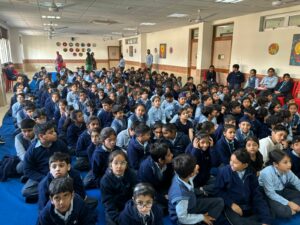Education
Education Through a ‘Humane’ Lens
Our history has traditionally embraced the importance of building relationships with animals. From an animal’s loyalty to bravery, various instances have been highlighted in historical texts and scriptures (Mahabharata and Ramayana). Many children grew up listening to stories, stories of compassion; further encouraging them to experience the human-animal bond. But in recent years, as we witness an increase in animal cruelty and pet abandonment cases, compassion seems to be at a loss today.
According to the report findings by the Federation of Indian Animal Protection Organisations (FIAPO) and All Creatures Great and Small (ACGS), between 2010-2020, a total of 4,93,910 animals were victims of crimes committed by humans. Keeping in mind that many cases go unreported, out of the 720 documented cases of crime against street animals, 20 cases were of assault by children. With nearly 50% of India’s population under the age of 25, such revelations underscore the urgent need to cultivate empathy and compassion from a young age. Humane Education, an approach that cultivates children to be empathetic and compassionate not only towards fellow beings but also all sentient beings, is an important pillar of 21st-century sensibilities.

(Picture Credits: Peedu’s People)
“Children are human beings to whom respect is due, superior to us by reason of their innocence and of the greater possibilities of their future.” ― Maria Montessori
Founded in 2021, India Animal Fund (IAF) along with NGOs like Peedu’s People; are working to ensure wholesome child development through holistic learning for school children. For young children and students to make informed and ethical choices, through humane education sessions, we introduce them to this concept via experiential, learning, observational and application learning. “Along with our partner Peedu’s People, we have delivered over 250 sessions across India. Around 10K+ children were introduced to humane education and workshops reached over 55 schools. The next steps involve expanding the programme and integrating it into the NCERT syllabus for broader reach.” says Sandeep Reddy, COO – India Animal Fund (IAF). From environmental conservation to social justice, such initiatives are crucial for creating a sustainable and equitable society.
Another study from Science Directs indicates that children who exhibit cruelty towards animals may have witnessed or experienced family violence and are at risk of engaging in human-directed aggression during adolescence and adulthood. Implementing such programmes not only prevents violence, but also increases the likelihood of detecting and intervening early. Not only would it be beneficial for the children from K-12, if implemented in the school curriculum, via teacher training programmes, educators or schoolteachers can also be equipped with the tools and resources needed to integrate humane education into their teaching practices.
While we have animal protection laws in our country, this strategic investment may lead to a cornerstone of our educational system. By nurturing empathy and compassion among children today, we can empower the next generation to build a better world for all living beings, for them to navigate an increasingly interconnected and complex world.
Authored By-
Nidhi Gupta
Manager- Content and Communications,
India Animal Fund (IAF)